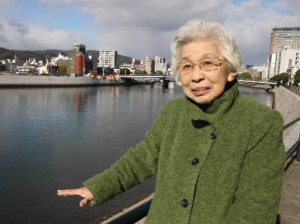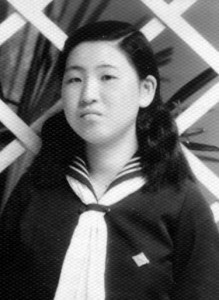Misako Yagi, 84, Asakita Ward, Hiroshima
Dec. 24, 2014
Thanks to her aunt’s love, she was able to endure
by Yuji Yamamoto, Staff Writer
Misako Yagi (nee Terao), 84, was 14 when she experienced the atomic bombing at a location only about a kilometer from the hypocenter. She lost her parents to the A-bomb, but her aunt, Yone Kihara (1895-1954) and others took care of her like her own parents. Thanks to their efforts, Ms. Yagi was able to endure the postwar years. She feels grateful to them for their love and wishes Yone were alive today to see the nation at peace.
Ms. Yagi’s parents owned a fruit and vegetable shop in Sorazaya-cho (part of today’s Naka Ward). Because they were busy with work, they asked Yone to look after her from the time she was a small child prior to entering elementary school.
The attack on Hiroshima took place when Ms. Yagi was a third-year student at Hiroshima First Municipal Girls’ School (now Funairi High School in Naka Ward). Normally, she would have been working as a mobilized student at a factory near her school. On that particular day, however, the factory was not operating because of a power shortage. Instead, she was at Yone’s home in Funairi-machi (part of today’s Naka Ward). She had happily finished some homework which involved sewing a blouse and was about to put it on when there was an intense flash of light--far brighter than sunlight--in the room. Then there was a roar, and the house collapsed.
Ms. Yagi’s right leg was pinned under a large pillar. Four or five men in the neighborhood heard her cries for help and lifted the pillar to pull her out. She had a cut on her right thigh, but she suffered no burns in the blast. Without knowing what had happened, she fled, along with Yone and her cousin, the late Shigeaki Kihara, who were in the house with her, to the nearby bank of the Tenma River.
The area was packed with people. Those with bad burns sought refuge in the river, but some were motionless, their faces in the water. Many were simply floating there. Ms. Yagi watched them, unable to help. Then black rain fell.
Around noon, the three survivors began walking toward Koi Station (now Nishihiroshima Station in Nishi Ward) in a long procession of others on foot, too. The family had decided to make that their destination in the event of an emergency. Walking barefoot on the road, Ms. Yagi felt the heat of the pavement on her skin. There was turmoil in front of the train station. Then they heard someone calling them, but were unable to recognize the person. When they asked for her name, they learned that it was Shigeaki’s wife. She was a pretty woman with fair skin, but now her face was red and swollen and the skin from both her arms was hanging in strips. She had been exposed to the atomic bomb while working at a building demolition site.
The four were taken by truck to Kanon National School in Kanon-mura (part of today’s Saeki Ward). When they arrived, it was dark outside, and many students were being carried in. Like Shigeaki’s wife, they had been exposed to the blast while working outside at building demolition sites. “Mother, help me.” “Give me water.” The voices of the injured echoed inside the school building, but their voices gradually grew weaker. The following morning, they were silent. Shigeaki’s wife died, too, with no further words.
Ms. Yagi’s house was located in Sorazaya-machi, less than a kilometer from the hypocenter, so she didn’t think her parents could have survived. When her elder brother returned from the war and searched for their parents, he learned that their mother had been at home at the time of the bombing but managed to flee to Ms. Yagi’s elder sister’s home in Yae-cho, Hiroshima Prefecture (part of today’s Kitahiroshima-cho). She died eight days later. Their father left home to work at a munitions factory, but his whereabouts remain unknown.
After the war ended, Yone and Shigeaki rented a house in Eba-machi (part of today’s Naka Ward) and looked after her. She graduated from the girls’ school in 1948. In the early 1950s, Yone and Shigeaki both died, one after another. “They took care of me in those difficult years,” Ms. Yagi said. “Thanks to them, I’m happy now. I want to thank them.”
In 1954, she married Masato Yagi, now 89. After they got married, they lived in five different cities in the Chugoku and Shikoku regions because of Masato’s job transfers. Wherever she was, she watched the annual Peace Memorial Ceremony in Hiroshima on TV on August 6 and offered a silent prayer. “Everyone worked hard for the country but had to die in such a tragic way because of the atomic bombing,” Ms. Yagi stressed. “The price paid for the war was so great. This must never happen again.”
Teenagers’ Impressions
Strong to live with positive attitude
Ms. Yagi said with a smile, “I’m really happy because I’m healthy.” Although she was exposed to the bomb at a place about one kilometer from the hypocenter, she hasn’t suffered any serious A-bomb diseases. I’m 15 years old, about the same age as Ms. Yagi was at that time. If I were her, I would worry about my health and feel depressed. She didn’t show her own sadness. I thought she was a strong person to live with such a positive attitude. (Nanaho Yamamoto, third-year junior high school student)
The students who died in regret
When I listened to Ms. Yagi, who told us in tears how these students died at Kanon National School, and I imagined how the students must have felt, I felt so sad and my whole body trembled. They died in regret without being able to do what they wanted with their lives. War deprives people of their lives. No one is happy in war. I want to live a full life each day and build a peaceful world. (Takeshi Iwata, first-year high school student)
We don’t want nuclear weapons that break people’s bonds
I was surprised to hear Ms. Yagi say she was unable to think about her family. I had thought that, above all, many people would be looking for family members. I hate the atomic bombing, thinking that people couldn’t even worry about family or friends. Nuclear weapons are horrifying weapons that break the bonds between people. We also must stop the ongoing wars immediately. (Mei Morimoto, first-year high school student)
(Originally published on December 22, 2014)









